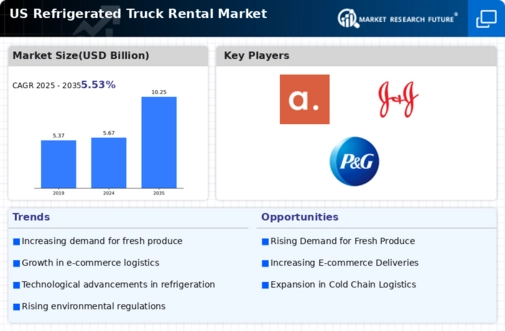The US Refrigerated Truck Rental Market has become increasingly competitive, driven by the need for efficient and reliable transportation solutions for temperature-sensitive goods. With a diverse range of players striving to capture market share, companies must develop innovative strategies and enhance their service offerings to stand out. Key factors such as technological advancements, regulatory compliance, and fluctuating demand are influencing competition within this sector. The market is characterized by a mix of established firms and emerging players, leading to dynamic shifts in pricing, service quality, and customer satisfaction.
Understanding the competitive landscape is critical for stakeholders looking to capitalize on growth opportunities in the refrigerated transportation sector. Pace Transportation has solidified its presence in the US Refrigerated Truck Rental Market by focusing on high-quality service and a customer-centric approach. The company's fleet is grounded in reliability, equipped with state-of-the-art cooling systems that ensure optimal preservation of goods during transit. Pace Transportation has established a strong reputation for its timely deliveries and maintenance support, which is a crucial component in the food and pharmaceuticals sectors where time and temperature management are paramount.
The company's commitment to sustainability and environmentally friendly practices further enhances its market strength, appealing to organizations looking for responsible partnerships. As a result, Pace Transportation has succeeded in building long-lasting customer relationships across various industries, reinforcing its competitive position in the marketplace. Swift Transportation also plays a significant role in the US Refrigerated Truck Rental Market, showcasing an expansive fleet that caters to a wide range of temperature-sensitive transportation needs. Known for its focus on efficiency and innovation, Swift Transportation actively invests in technology to optimize routes and reduce fuel consumption, ultimately passing savings on to its customers.
The company’s offerings encompass various rental options, providing flexibility to clients who require short-term or long-term rental solutions. Swift's market presence is further bolstered by strategic mergers and acquisitions, allowing it to broaden its operational footprint across the United States. This strategic growth complements its already robust logistics network, ensuring timely and reliable service delivery. The combination of advanced fleet management and a commitment to customer satisfaction positions Swift Transportation favorably in the competitive landscape of refrigerated truck rentals within the US.













